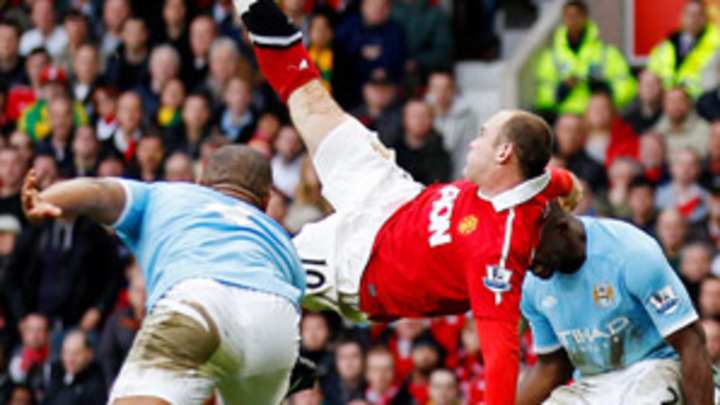Wayne Rooney's goal for ages a defining moment for father, son


Two weeks after I graduated from college, I moved to New York and took a fact-checking job at Sports Illustrated, providing just enough money for an empty apartment and a nightly repast of Ray's pizza and Coors Light, which I always ingested alone, supine in front of the TV, whose faces never judged me.
It was in that position -- a beer can on my stomach, rising and falling like a tiny watercraft at anchor -- that I watched Kirk Gibson's limp-off home run to win Game 1 of that year's World Series. Like Jack Buck, I literally could not believe what I had just seen. Lacking any other witnesses to confirm it, I lay in a torpor in front of the tube, wondering if the pictures were real.
I can't recall a single other instance of being alone, not-quite believing what I'd just seen on TV, until this past Saturday morning, when my wife and four children unaccountably left me alone in the house for the first time in six years.
To break the deafening silence, I turned on the Manchester United-Manchester City match. Seventy-eight minutes in, when Wayne Rooney scored his now-famous, game-winning, universally headlined "wondergoal" -- from a bicycle kick, chilena, scissor-kick or any number of other inadequate descriptives -- I sat on the edge of the bed asking myself: What, if anything, just happened?
A thousand miles away, in Bonita Springs, Fla., my father, a lifelong soccerphobe who turns 77 this year, had much the same reaction, alone in his condo. But he saw the goal hours later, on tape, in the only way he'd ever catch any televised soccer: On the local news, which offered little context. Was this kind of goal routine at soccer's highest level? Was this Rooney guy a superstar, or the aging journeyman he resembled? Or was he in fact a magical leprechaun, this Wayne Rooney, who had just done something that my father -- an athlete and avid consumer of TV sports -- found almost unbelievable?
Whatever the hell had just happened, my father wanted to talk about it. He phoned me right away. "Apparently," he said, taking the first tentative steps of his life onto the foreign soil of soccer-speak, "it's called a bicycle kick."
He deduced that such a goal was extraordinary, by mere virtue of it being shown on the local news in Fort Myers, which had successfully ignored all previous Manchester derbies. But he knew nothing else about Rooney, bicycle kicks, Man United or its manager, Sir Alex Ferguson. ("Some guy," Dad said, referring to SAF, "said it was the best goal he'd seen in 25 years.")
And so we talked on the telephone about the mechanics of the kick, and I briefed him on Rooney's upbringing in the Croxteth suburb of Liverpool, on his Everton years, the proper pronunciation of "derby," Rooney's disenchantment with his astronomical wages, his alleged escort escapades -- his escort-a-pades? -- the £200 he reportedly paid for a pack of Marlboros, his yearlong slump and ensuing vilification -- and how none of that seemed to matter to United fans in light of his slate-wiping wondergoal.
After the match, on The Times of London website, where I'd gone to seek confirmation in the communal of what I'd just seen or not seen, a United supporter calling himself "John HH" wrote of Rooney's sudden renaissance: "It was like the moment when, after you'd agreed to meet the girl you love at 11:00 and she still hasn't arrived at 11:30, no phone call, nothing, she suddenly appears at the end of a crowded street, and your heart almost leaps out of its chest, and the sense of relief makes you feel strangely nauseous."
Rooney acknowledged that nine out of 10 such bicycle kicks would end up in the stands, but his good luck and exquisite skill -- combined with a big occasion in the self-proclaimed Theater of Dreams -- alchemized at least one soccer agnostic in Florida into a believer.
I stopped proselytizing years ago, stopped forcing my enthusiasms on others. I won't bore you with my favorite bands or books, and don't like it when people tell me that I have to eat at a certain restaurant next time I'm in Phoenix merely because they ate in that restaurant the one time they were in Phoenix. We don't all have to like the same things.
My father, though, was never hostile to soccer. On the contrary: He said during the last World Cup that he wished he could divine the strategies, recognize the formations, understand what was going on away from the ball. In London last winter, in a driving rain, it was he who insisted we tour Arsenal's home ground, because he knew I was a fan.
In the dressing room, he dutifully sat in Gael Clichy's locker. In the directors' box, he rested his brand-new prosthetic knee in an aisle seat, which the tour guide informed him was where Fabio Capello sat when he watched the Gunners. My Dad, having never heard of the England manager, pretended to be impressed. (This was before the World Cup, when such a thing was still possible.) He liked that I liked all this, and that was enough.
But the scales didn't really fall from his eyes until Saturday, when Rooney ripped them off singlehandedly. Singlefootedly.
Of course, most of soccer consists of not scoring goals, and certainly not scoring goals like Rooney's. To follow soccer solely because of such a goal is to set oneself up for disappointment. Despite what you saw in Monster's Ball, not every small-town waitress resembles Halle Berry.
It's enough that the wondergoal impressed my father -- that it blew his mind and almost certainly his knees, as I could dimly hear him trying to recreate the thing on his echoing lanai as we spoke.
As a result of that goal, we'll now talk about Man United's progress, and whether Rooney regains his form, and if Arsenal can overcome Man U in the Premier League, and whether I think Gael Clichy's locker has remained as immaculate as the day we saw it.
Maybe he'll sample Arsenal and Barcelona in the Champions League today, with its potential for another extraordinary moment -- another late conversion like Rooney's.
All that really matters is that he found soccer in the 77th minute of what I hope will be a life that goes the full 90, and then sees a Fergusonian share of stoppage time. He made a magical late conversion of his own, my Dad. We have Rooney to thank for that, as we ride off together now, father and son, on a bicycle kick for two.
